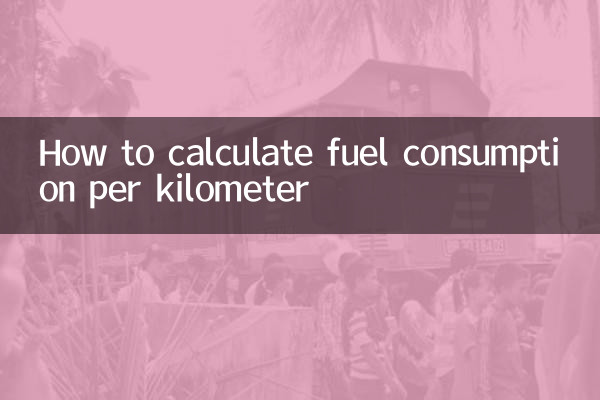How to calculate fuel consumption per kilometer
As oil prices continue to fluctuate, more and more car owners are paying attention to the fuel consumption of their vehicles. Calculating fuel consumption per kilometer can not only help car owners understand the economy of the vehicle, but also provide a reference for daily travel. This article will detail how to calculate fuel consumption per kilometer and provide structured data for readers to better understand.
1. Why should we calculate fuel consumption per kilometer?

Calculating fuel consumption per kilometer can help car owners:
1. Understand the economy of the vehicle and determine whether it is necessary to replace it with a more fuel-efficient model.
2. Plan long-distance travel and estimate fuel costs.
3. Detect vehicle abnormalities in time. For example, a sudden increase in fuel consumption may mean that the vehicle is faulty.
2. Method of calculating fuel consumption per kilometer
The formula for calculating fuel consumption per kilometer is as follows:
| steps | Description |
|---|---|
| 1. Fill up the fuel tank | Fill up the tank at the gas station and record the current mileage (marked as A). |
| 2. Travel a certain distance | Drive the vehicle normally and travel a certain distance (more than 100 kilometers is recommended). |
| 3. Fill the fuel tank again | After driving, fill up the fuel tank again and record the refueling amount (marked as B) and the current mileage (marked as C). |
| 4. Calculate fuel consumption | Fuel consumption (liters/100 kilometers) = (B ÷ (C - A)) × 100 |
3. Example calculation
Assume that a car owner has a mileage of 1,000 kilometers after filling up the fuel tank, and then fills up the fuel tank again after driving 200 kilometers, with a fuel volume of 15 liters. The fuel consumption is calculated as follows:
| parameters | numerical value |
|---|---|
| Initial mileage (A) | 1000 kilometers |
| Ending mileage (C) | 1200 kilometers |
| Refueling amount (B) | 15 liters |
| Travel distance (C - A) | 200 kilometers |
| Fuel consumption (liters/100 kilometers) | (15 ÷ 200) × 100 = 7.5 liters/100 kilometers |
4. Factors affecting fuel consumption
Fuel consumption is affected by many factors. Here are some common ones:
| factors | influence |
|---|---|
| driving habits | Rapid acceleration and braking will increase fuel consumption. |
| road conditions | Congested roads consume more fuel than smooth roads. |
| vehicle load | The greater the load, the higher the fuel consumption. |
| vehicle maintenance | Vehicles that are not regularly maintained may consume more fuel. |
| weather | Cold or hot weather can affect fuel consumption. |
5. How to reduce fuel consumption?
1.Maintain good driving habits: Avoid sudden acceleration and braking, and try to keep driving at a constant speed.
2.Maintain your vehicle regularly: Replace engine oil, air filter, etc. to ensure the vehicle is in optimal condition.
3.reduce load: Do not leave unnecessary items in the car for a long time.
4.Plan your route properly: Avoid congested roads and choose a smoother route.
5.Check tire pressure: Insufficient tire pressure will increase fuel consumption.
6. Summary
Calculating fuel consumption per kilometer is a simple but practical skill that can help car owners better manage their vehicles and travel costs. By regularly calculating fuel consumption, car owners can detect vehicle problems in time and take appropriate measures. We hope that the methods and data provided in this article can help you calculate fuel consumption more accurately and provide a reference for your travel.

check the details

check the details